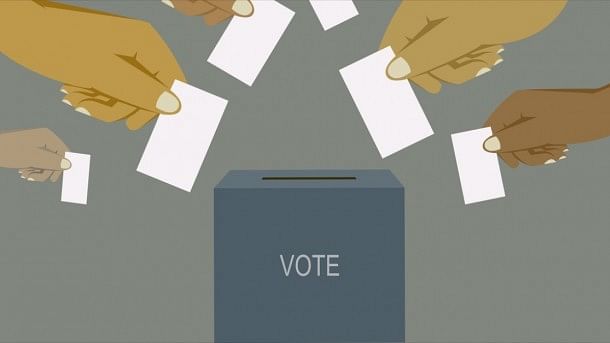
Representative image for voting.
Credit: iStock Images
Jammu: Banned under the anti-terror law in 2019, the influential pro-Pakistan religio-political outfit Jamaat-e-Islami (JeI) Jammu and Kashmir is likely to contest the upcoming assembly elections in the Union Territory (UT).
Recently, the JeI head Fayaz Hamid and several leaders were released amid ongoing discussions between the JeI's highest decision-making body, Shoora, and New Delhi, focusing on the outfit's participation in the elections and other related issues. This release is viewed as part of the negotiations.
If JeI participates, it would be a significant step towards integrating the outfit into mainstream politics. JeI, inspired by Jamaat-e-Islami Pakistan founder Abu Ala Maududi, has not contested elections since the 1987 assembly election, alleged to be rigged.
The outfit, considered the ideological source of Hizbul Mujahideen, was banned on February 28, 2019, following a deadly suicide attack in Pulwama that killed over 40 Central Reserve Police Force personnel.
Track all the latest updates on Union Budget 2024 with our Live Blog
Sources indicate that Hamid and other leaders support Shoora's decision on electoral participation, with potential options being forming their own group, participating under the JeI banner if the ban is lifted, or supporting another regional party excluding the National Conference, People’s Democratic Party, Apni Party, and Peoples Conference.
In a post-release video, Hamid emphasized the panel's authority in resolving issues and indicated future actions would follow the panel's decisions. Senior JeI leader Faheem Ramzan highlighted the party's historical electoral participation since 1971 and suggested amending the JeI constitution to lift the ban.
Faheem Ramzan, a senior JeI leader and former general secretary, noted that electoral participation is not new for the JeI, recalling the party's involvement in polls since 1971 and its past role as the “main opposition” in the Assembly. Ramzan also mentioned the possibility of amending the JeI constitution to facilitate the lifting of the ban.
However, analysts believe lifting the ban, extended for five more years in February, is unlikely soon. In May, panel head Ghulam Qadir Wani expressed willingness to participate in elections if the ban is revoked.
Analysts foresee potential internal conflicts within JeI over election participation. JeI was a key member of the Muslim United Front, which opposed the National Conference in the controversial 1987 J&K assembly elections, alleged to be rigged, leading to some MUF supporters joining militancy.
Jamaat’s candidate, Yosuf Shah, who lost the elections from Srinagar’s Amirakadal constituency, later crossed over to Pakistan-occupied-Kashmir, to launch a terror outfit Hizb-ul-Mujahideen. Listed as one of the most wanted in India, Shah assumed a new name- Syed Salahuddin.
The 1987 elections are considered the cradle of Kashmir militancy and Jamaat’s willingness to join the political process after almost four decades turns a new chapter in the militancy afflicted valley.
While overtly the JeI preached election boycott campaigns from 1989 to 2019, covertly it used to campaign for the People’s Democratic Party since 2002 Assembly elections.